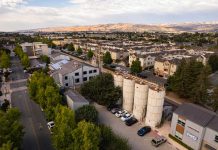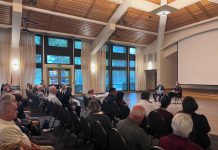I had a lot of good intentions this week, but as some say the
road to hell is paved with good intentions. It may fit my subject
today to note that this saying is often misattributed to Samuel
Johnson.
I had a lot of good intentions this week, but as some say the road to hell is paved with good intentions. It may fit my subject today to note that this saying is often misattributed to Samuel Johnson.
Following the machinations of the Santa Clara Valley Water District means that I have to pay attention to what is on their agenda. That is easy, subscribe from the water district’s Web site (www.valleywater.org) and you get announcements of every meeting of the Board of Directors.
That is where I learned of Wednesday night’s session at the Morgan Hill Community and Cultural Center at which the Water District presented their Annual Report on the Protection and Augmentation of Water Supplies – 2009 and to explain their Recommended Groundwater Production Charges for Fiscal Year 2009-2010. It is a challenging subject but at least I was able to download the Report and their Recommendations and read them before the meeting.
The problem was that I was not able to attend the public hearing and that, in itself, has consequences beyond the fact that I may have missed important updates to the document they provided. Surely, the presenters must have commented on the fact that a San Jose judge has ruled that the current method of computing and collecting groundwater charges is not constitutional in California. It violates the provisions of Proposition 218.
Just as importantly, the number of people who show up at a hearing is one indication of whether or not people care, and I did not do my part. I hope that the rest of you did. I know that two of the hearings on whether or not to apply term limits to Water District Directors had zero and two attendees, respectively. That does not demonstrate a high level of civic participation.
Underlying this is another thought, one concerning the role of the media, especially in the coverage of our government and local issues.
I digress a bit here, but will come back to the subject. It may be that one of my cultural losses was to not have been hooked on watching HBO’s The Wire. I really began paying attention after listening to the show’s producer, David Simon talk about it with Bill Moyers.
Simon, who for two decades, was a reporter for the Baltimore Sun, is quite articulate about the importance of good reporting and good editing in local journalism. On Wednesday, he testified on this subject at a U.S. Senate Hearing regarding the future of journalism. Simon rather blamed much of the problems of newspapers in America from the fact that they started cutting staff long before the competition from the Internet took away much of the advertising revenue stream that funded good journalism.
According to Simon, “When locally-based, family-owned newspapers like The Sun were consolidated into publicly-owned newspaper chains, an essential dynamic, an essential trust between the journalism and the communities served by that journalism, was betrayed.”
The result is that our community, no matter how broadly we define that term, is not well served. We see many stories about the fact that farmers are not going to get any water this year and many of these stories contain the framing of jobs vs. fish. Nothing could be further from the truth.
To begin with, many of the farmers in the Central Valley are not going to be affected at all. Holders of senior water rights in the Sacramento River Valley will get 100 percent of their allocation. Those in the Friant block will get 80 percent. It is only those in the Westland’s Water District that are so severely restricted. This is where farmers have been encouraged to replace row crops which could be fallowed for a bad water year with orchards that can not. It was a bad business decision and not one that should determine California Water Policy. Television shows us pictures of Latino workers demonstrating for their jobs and never mention the fact that the United Farm Workers is not involved and has distanced themselves from the big agriculture promoted demonstrations.
Without the institutional knowledge that Simon values, we are not learning enough to make informed decisions should any of this come to a vote.
Were the question of term limits brought to the voters here, I am not sure what I would do. In a certain sense, the directors need to acquire that same institutional knowledge – of course, with an informed media that can hold their feet to the fire.
I can say that I would not support the re-election of any of the current directors; those who have allowed an unconstitutional method of charging out costs to continue unquestioned for years, those who have failed to provide adequate long-term, ecologically–sound planning for meeting our true water needs.







